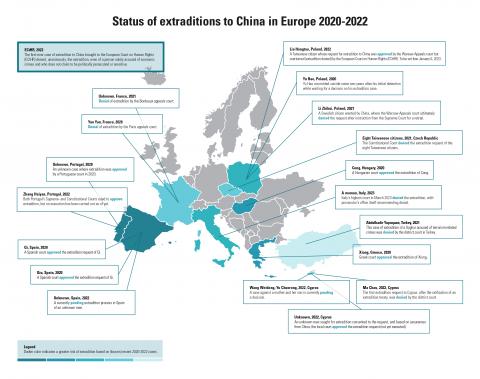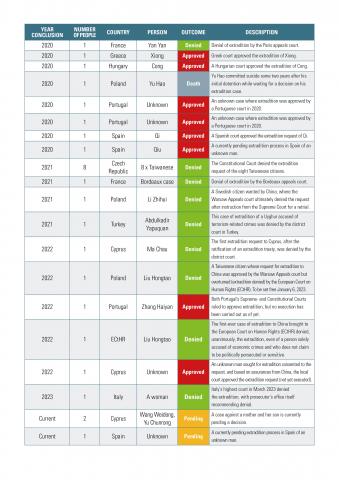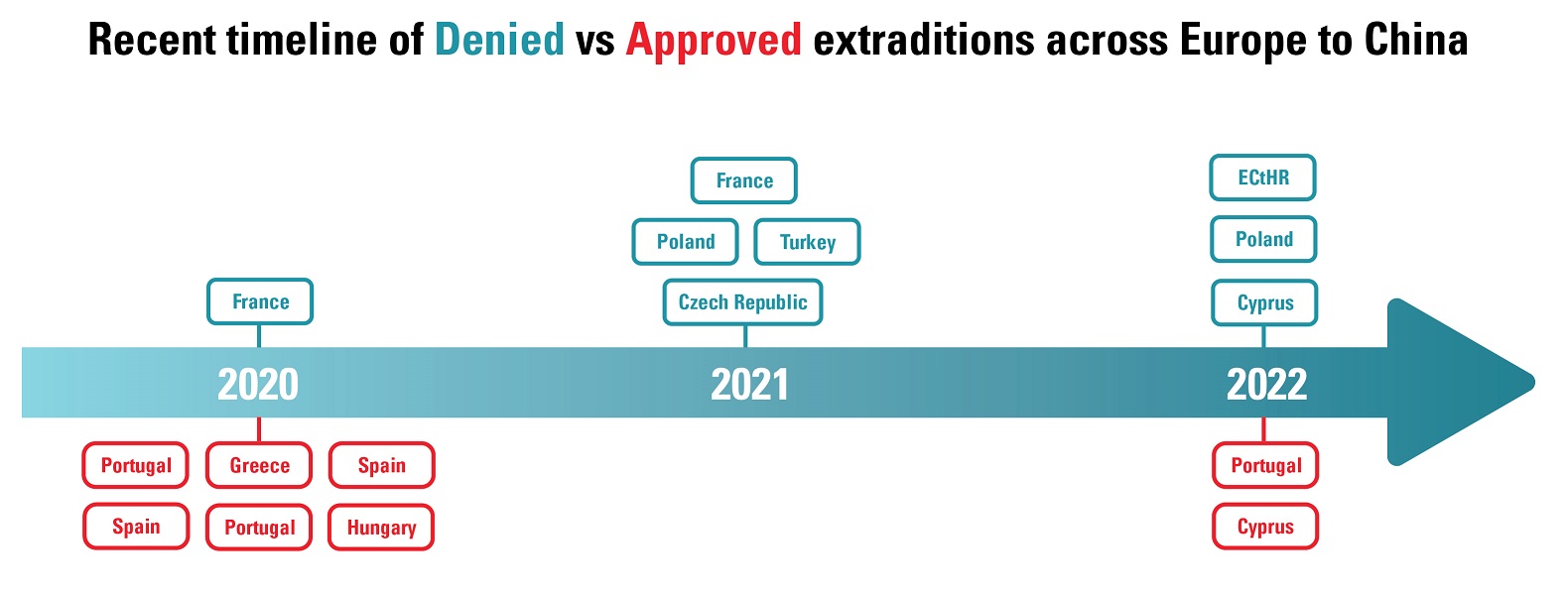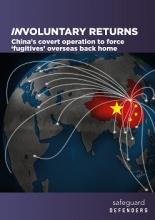Cyprus denies China extradition, ECtHR decision blocking extradition to China takes effect
The Cypriot Court of First Instance denied the extradition of a Chinese man wanted for economic crimes to China on 23 December 2022, following a prolonged legal battle between Beijing and the defence. The judge ruled that the extradition of Ma Chao would violate Article 3 of the European Convention on Human Rights (ECHR) on torture and ill-treatment. Previous extraditions to China have been denied on the same argument (for example by Sweden's Supreme Court in 2019).
The court also said diplomatic assurances offered by the Chinese State were insufficient to persuade them that there were no risks to Ma's human rights. More strikingly is that the court also refused the extradition on the grounds of Article 5, because of the significant risk of arbitrary detention, and, for the first time by a European court, Article 6, which guarantees the right to a fair trial.
READ MORE: Landmark decision could herald end to Europe’s extraditions to China
Safeguard Defenders provided an expert’s report on China's criminal justice system, and its director, Peter Dahlin, appeared for the defence at the hearing, as well as in cross-examination with the prosecutor, alongside several well-known experts in Chinese law. The judge declared all witnesses called to the stand as authoritative experts, the testimony between the different experts were consistent, and took note of the seriousness of the reports provided as basis for the testimony. The Chinese State sent a delegation to appear for the prosecution, including a professor of law who drafted China’s own extradition law, in an appearance that was counterproductive to say the least.
READ MORE: Cyprus denies extradition to China in a case illustrating transnational repression acts
Two more Chinese nationals are currently awaiting conclusion of an extradition process in Cyprus - mother and son Wang Weidong and Yu Chunrong.
End to EU extraditions to China
Also a 2022 ruling by the European Court of Human Rights (ECtHR) that Poland could not extradite Taiwanese national Liu Hongtao to China because it would violate Article 3 of the ECHR, (on torture and ill-treatment). In principle, this should make any extradition to China within the EU and Europe in general extremely difficult, if not impossible, to authorize. UPDATE: At the very last moment, on January 5, 2023, the Polish authorities filed an appeal against the ECtHR decision. The decision, taken October 6, 2022, was set to go into effect January 6, 2023, unless appealed to the highest instance, the Grand Chamber. On January 30, 2023, ECtHR denied Poland's appeal, and decision went into effect.

Yet, extradition processes on Beijing's requests continue in the EU. First decisions are being mulled in Italy and Spain for two unnamed individuals, while in Portugal, Zhang Haiyan, who has been approved for extradition by the country’s highest court (which failed to take the ECHR into account in its verdict), is still waiting for final approval for his extradition. However, in light of the ECtHR ruling that will be difficult to execute, unless overturned by the ECtHR's highest instance, the Grand Chamber.
In another case in Cyprus, a court approved the extradition of an individual to China, who did not challenge the ruling. Extradition has not yet taken place.
READ MORE: Portugal set to extradite yet more people to China
Extradition to China 2020-2023
Between 2020 and 2022, 19 known extradition requests from China were handled in Europe (18 in the EU and one in Turkey). Decisions were made in 16 (eight approvals, eight denials), two are still pending, and the target in one case died.

Unsurprisingly, the countries that agreed to Beijing's extradition requests were the usual suspects - one case each in Greece, Hungary and Cyprus (the target did not challenge the ruling), three cases in Portugal and two cases in Spain. Poland also approved one case, but that was overturned by the ECtHR.
READ MORE: Czech Republic moves closer to suspending extradition treaty with Hong Kong
Cases are still pending in Cyprus and Spain. One additional case, in Poland did not see a legal resolution, as the target, Yu Hao, committed suicide after spending two years in detention waiting for a decision.

Seven cases were denied. These were one case each in Cyprus, the Czech Republic and Turkey, two cases in France, and two cases in Poland, and Turkey. With the exception of the case in Turkey, concerning Uyghur Abdulkadir Yapuquan, the targets were all wanted for alleged economic crimes, the same as the case that reached the ECtHR.
READ MORE: Swedish Supreme Court rules against extradition to China
Of key concern now is that the remaining cases - in Cyprus and Spain - are treated consistently with the ECtHR verdict and denied. Also, that those already approved for extradition (Cyprus and Portugal) will be blocked by the respective Ministries of Justice.
As the ECtHR ruling was unanimous and concerned an (alleged) economic crime (not political), it should now be impossible for any judicial or political body to approve an extradition to China from the 46 European countries bound by the ECHR. This also means EU governments should stop accepting new extradition requests from China to avoid wasting courts' time and taxpayers' money. All EU countries with remaining extradition treaties with China should now move to terminate or suspend them until such time that China has proved it has reformed its criminal justice system concerning fair trials, arbitrary detention, and use of torture and ill-treatment.
 The first comprehensive report on China’s Fox Hunt and Sky Net operations, run by China’s Communist Party’s anti-corruption watchdog and Chinese police, aimed at forcing high-value targets to return to China. At the time of writing, the Fox Hunt operation has claimed over 11,000 successful returns of alleged fugitives from over 120 countries, many of them via “involuntary” return operations, ranging from threats to, or detention of, family back in China, sending agents abroad to harass targets in host countries, and kidnappings.
The first comprehensive report on China’s Fox Hunt and Sky Net operations, run by China’s Communist Party’s anti-corruption watchdog and Chinese police, aimed at forcing high-value targets to return to China. At the time of writing, the Fox Hunt operation has claimed over 11,000 successful returns of alleged fugitives from over 120 countries, many of them via “involuntary” return operations, ranging from threats to, or detention of, family back in China, sending agents abroad to harass targets in host countries, and kidnappings.
 The first extensive report on China’s use of extradition requests and how such extradition cooperation undermines the rule of law commitments in the countries that cooperate with them and undermine related treatises and values internationally. It also maps how China abuses INTERPOL as part of extradition-based manhunts and how attempts at extradition often serve political purposes. It also stands as a how-to manual for legal practitioners in best practices for stopping extraditions to China and how such would undermine rule of law commitments.
The first extensive report on China’s use of extradition requests and how such extradition cooperation undermines the rule of law commitments in the countries that cooperate with them and undermine related treatises and values internationally. It also maps how China abuses INTERPOL as part of extradition-based manhunts and how attempts at extradition often serve political purposes. It also stands as a how-to manual for legal practitioners in best practices for stopping extraditions to China and how such would undermine rule of law commitments.